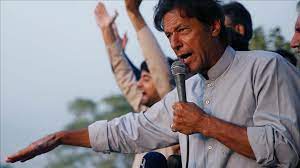No-confidence motion and political polarisation
The fears of political violence have increased since both the government and opposition announced public rallies in Islamabad
The vote of
no-confidence against the government is part of a democratic process. The
opposition has the constitutional right to move the motion of no-confidence. The
government also has the right to defend itself and contact the allies and other
parties. And all this could be done democratically and within parliamentary norms
and practices.
But it seems that government has decided to mobilise its supporters on the streets. The government wants to show to its MNAs and general public that PTI is still a popular party and enjoys the mass support. The government wants to build pressure on the streets to keep the parliamentary party intact. The political confrontation and violence might help the PTI for a while but surely it will weaken the democracy and political parties.
It seems
that government wants to stop its dissident members of national assembly to
cast their votes during the vote of no-confidence. Now the government wants to
put public pressure on the MNAs through the public gatherings. The opposition is claiming the support of nearly two dozen lawmakers of ruling PTI. The PTI has the right to initiate disciplinary proceedings against the lawmakers who wants to defect under the defection clause of the constitution.
The
political temperature is rising in Pakistan as the day of vote of no-confidence
is approaching. The government ministers are openly threatening the ruling
party lawmakers to face consequences and violence if anybody tried to vote
against PM Imran Khan in the national assembly.
Fears of a
violent conflict between the ruling PTI and the opposition political parties
are growing after the PDM and PTI have given the calls for public gatherings in Islamabad.
Both the
government and opposition have announced to organise public rallies in Islamabad
before the vote of no-confidence. The government has announced to organise a
huge public gathering on March 27 while PDM has announced a long march that
will enter into federal capital on March 25. The fears are increasing that such
hostile atmosphere might lead to political violence.
One can
understand that there is lot on the stake on both sides. Both sides are doing
whatever needs to be done to achieve their political objectives. If the
political forces resort to political violence to solve their differences and
problems then democracy will be the real victim of this chaos. It is the
responsibility of the government to lower the political temperatures. But
instead of lower the political temperature, the PTI government is increasing the
political temperature.
The ruling PTI
has asked its lawmakers not to attend the proceeding of the national Assembly
on voting day. The government ministers are threatening the members of National
Assembly (MNAs) of the ruling party to face consequences if anyone tried to
change loyalty and decide to defect to opposition.
The
statement from Information Minister Fawad Chaudhry that anyone who wanted to
vote for the no-trust motion would have to pass through a crowd of PTI
supporters on their way to and from parliament betrays his party leadership’s
desperation to use any tool, including the threat of violence, to defeat the
motion. It is sad that the ruling party has brought a constitutional battle out
of parliament and onto the streets, ignoring the potentially catastrophic
consequences for the political system and economy.
It is
pointless to wonder whether these are just threats or will actually translate
into some sort of untoward action. When there are charged crowds, it becomes
difficult for anyone to control the consequences. Not to be left behind, the
opposition, too, is not taking this lightly and PDM chief Maulana Fazlur Rahman
has also announced that there will be a long march to Islamabad starting on
March 23 and a sit-in till the vote of no-confidence is complete.
Nothing good
can come out of two opposing sets of charged crowds in one space. In this
situation, the onus is on the sitting government to show restraint, curb its
enthusiasm for toxicity and tries to work matters through by urging dialogue
and peace. That, however, seems to be far from what the PTI government is
thinking.
This confrontation and violent methods to solve the political crisis will not solve anything. the crisis is certainly to intensify and deepen if situation led to the violence on the streets of federal capital. Both the democracy and economy will be the real victims of this political madness. The people of Pakistan are already suffering due to the ever rising inflation, poverty and unemployment. Pakistan needs political stability and inclusive economic growth to address the core issues faced by the masses.
One hopes
better sense prevails at least in the government corridors failing which there
will be little incentive for the opposition to call off its sit-in either. Both
sides need to take a step back and cancel their plans, which may also interfere
with the vote on the resolution or, intentionally or otherwise, keep the
parliamentarians from voting according to their conscience.
Let the
lawmakers expressed their free will and political expression in the assembly without
any pressure.
The Editor














Post a Comment